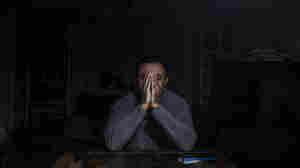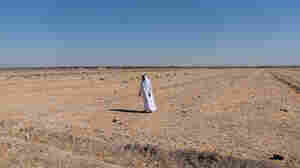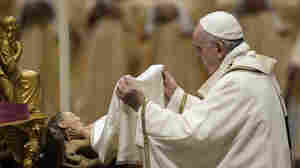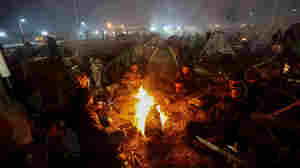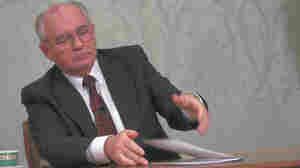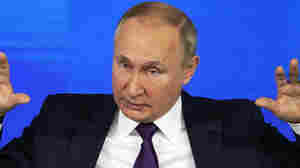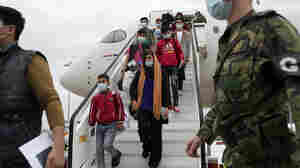French President Emmanuel Macron during departures at the end of an EU Summit in Brussels, last month. Macron told a French newspaper this week that he wanted to "piss off" the unvaccinating, drawing the ire of opposition politicians. Stephanie Lecocq/AP hide caption
Europe
An employee walks among the cars during the inauguration of a factory that will recondition used cars near Paris, on Nov. 30. Eric Piermont/AFP via Getty Images hide caption
Sheep and goats stand together on Monday in Schneverdingen, Germany, as they form an approximately 330-foot syringe to promote vaccinations against COVID-19. Philipp Schulze/dpa via AP hide caption
Blend, a Kurd from Iraq, considers himself lucky. He has only spent 14 days in a camp on the Belarusian side of the border and five days in the woods after crossing to the Polish side. When his kidney problems started to become unbearable because of lack of food and water for the last days, and he couldn't walk longer, volunteers from Polish aid organizations arrived to help. Kasia Strek for NPR hide caption
A Ukrainian soldier walks in a trench on the front line in Zolote, Ukraine, earlier this month. A buildup of Russian troops along the border with Ukraine has heightened worries that Russia intends to invade. Brendan Hoffman/Getty Images hide caption
Iraq's average annual temperatures are increasing at nearly double the rate of Earth's temperature rise. This photograph accompanies Ruth Sherlock's story about how climate change is affecting marshlands and the way of life in Iraq. Mootaz Sami for NPR hide caption
Pope Francis unveils a statue of Baby Jesus as he celebrates Christmas Eve Mass at St. Peter's Basilica, at the Vatican, on Friday. Alessandra Tarantino/AP hide caption
Migrants aiming to cross into Poland camp near the Bruzgi-Kuznica border crossing on the Belarusian-Polish border on Nov. 17. Maxim Guchek/BelTA/AFP via Getty Images hide caption
Syrians say Belarus deported them even though they're wanted by Assad's regime
Soviet leader Mikhail Gorbachev closes his resignation speech after delivering it at the Kremlin in Moscow on Dec. 25, 1991. After 74 years, the Soviet Union was dissolved, breaking into 15 countries. But there's often been friction among the former Soviet republics, including the current confrontation between Russia and Ukraine. Liu Heung Shing/AP hide caption
How the Soviet Union's collapse explains the current Russia-Ukraine tension
Russian President Vladimir Putin during his annual news conference in Moscow, Russia, Thursday, Dec. 23, 2021. Alexander Zemlianichenko/AP hide caption
Syrian Kurd Bushra, who only gave her first name, poses for a photograph in Minsk, Belarus, in September. Bushra fled Syria when she saw no end to the risks of staying home. After a harrowing journey, she has made it to Germany. AP file photo hide caption
People queue outside the newly set up vaccination center at London's Wembley Stadium to receive a COVID-19 vaccine or booster on Sunday, as the booster rollout accelerates in England and case numbers spike. Tolga Akmen/AFP via Getty Images hide caption
Afghan music students, teachers and their families disembark from their flight to Lisbon on Dec. 13. The group of more than 270 evacuees had been staying in Doha, awaiting resettlement in Portugal. Armando Franca/AP hide caption
Afghan music students escaped the Taliban and are beginning their new lives abroad
Russian Deputy Foreign Minister Sergey Ryabkov outlined Moscow's demands for security guarantees excluding NATO's membership for Ukraine and other Russian neighbors and the deployments of weapons there. Thomas Peter/AP file photo hide caption
Helen Morgan of the Liberal Democrats makes a speech after being declared the winner in the North Shropshire by-election early Friday. Her victory is another setback for embattled PM Boris Johnson. Jacob King/AP hide caption
A woman is administered a COVID-19 vaccine at a center on the outskirts of Sarajevo. Bosnia has so far inoculated just under a quarter of its 3.3 million people, one of the lowest rates in Europe. AP hide caption
Police stand in front of protesters during a demonstration of Germany's "Querdenker" (Lateral Thinkers) movement in November, in Leipzig, eastern Germany. Stringer/AFP via Getty Images hide caption
Costumers gather for food and drinks at Time Out Market in Lisbon, Portugal. Claire Harbage/NPR hide caption
Portugal has one of the top vaccination rates but isn't taking chances with omicron
U.S. President Bill Clinton raises his glass to toast with Russian President Boris Yeltsin at a dinner reception in Moscow in 1995. Busy with political and economic crises that followed the 1991 collapse of the Soviet Union, Yeltsin paid little attention when Poland, Hungary and the Czech Republic joined NATO in 1999. Alexander Zemlianichenko/AP file photo hide caption
Russian President Vladimir Putin speaks with President Biden about the tensions over Ukraine via a videoconference on Dec. 7. Russia has massed some 100,000 troops near its border with Ukraine. As Russia's leader, Putin has sent Russian forces on multiple combat missions, including a 2014 invasion of Ukraine. Mikhail Metzel/AP hide caption



